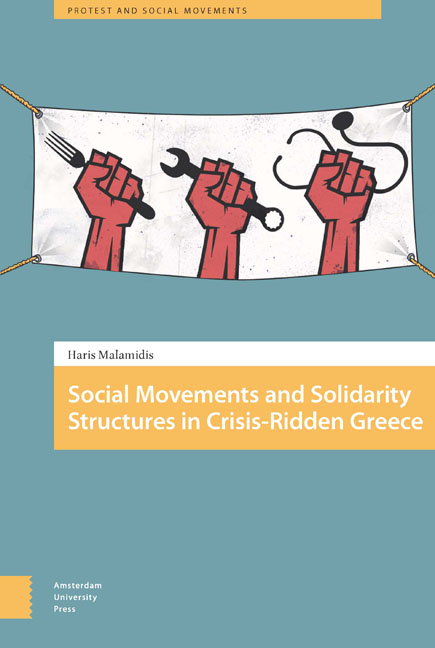Book contents
7 - Boundary Enlargement in Different Contexts
Published online by Cambridge University Press: 25 November 2020
Summary
Abstract
This chapter examines how the process of boundary enlargement applies to the 2011 Spanish and 2001 Argentinean anti-austerity mobilizations. After discussing boundary enlargement with regards to crisis-ridden Greece, this chapter explores how the process is formed in different geographical and chronological contexts. Taking into consideration the distinct contentious history of the two countries, it analyses the formation of boundary enlargement by elaborating secondary literature. Focusing on the Spanish mobilizations, the chapter investigates the contentious mechanisms developed in the cases of housing, health and education movements, and discusses the municipalist trend and the feminization of politics. Respectively, in the Argentinean case it focuses on the unemployed workers’ movement, neighbourhood assemblies and recuperated factories, and touches upon the affective politics.
Keywords: Spanish crisis; Argentinean crisis; Municipalism; Feminization of politics; Affective politics
The previous chapters analyse the process of boundary enlargement in crisis-ridden Greece. Without limiting its function to the incorporation of service-oriented repertoires, this section focuses on the provision of unofficial welfare services by social movement actors in other contexts. By paying attention to the Spanish anti-austerity mobilizations in 2011 and the Argentinean movements of the 2001 crisis, we highlight a few instances in which the process of boundary enlargement may contribute to empirical research.
The Spanish anti-austerity mobilizations
Spain has experienced three protest cycles from the 1960s onwards (Portos, 2019, p. 48), with the last one ending in 2004 after the PSOE, Partido Socialista Obrero Español (Spanish Socialist Workers’ Party) government complied with the movements’ demands to withdraw the Spanish troops from Iraq (Karamichas, 2007). The advent of international social unrest in 2010-2011 followed by the economic crisis, triggered a new protest cycle against austerity measures. Critical scholars emphasize that public debt was not the cause of the Spanish crisis but, rather, its symptom, since the uneven geographical social development of the European Union (EU) has enabled the economic and political dominance of a “closed” number of countries over the region (Hadjimichalis, 2011). Nevertheless, the massive increase of unemployment and continuous cuts in public spending, the growing mistrust of people towards the traditional democratic institutions, and a widespread sense of corruption regarding the political elites (Anduiza et al., 2014, p. 751; Charnock et al., 2012, p. 9; Fortes and Brihuega, 2012), were among the main reasons for bringing thousands of people to the streets.
- Type
- Chapter
- Information
- Publisher: Amsterdam University PressPrint publication year: 2020



